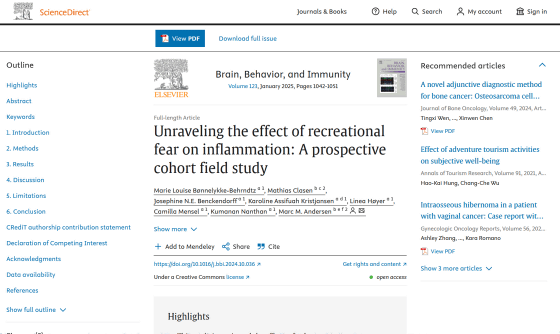How does visiting a haunted house affect the immune system?

Huge haunted houses at amusement parks and other places have a charm that makes people want to go in even if they know they will be scared. A research team from
Unraveling the effect of recreational fear on inflammation: A prospective cohort field study - ScienceDirect
https://www.sciencedirect.com/science/article/pii/S0889159124006780

Haunted Houses Have a Surprising Effect on The Immune System : ScienceAlert
https://www.sciencealert.com/haunted-houses-have-a-surprising-effect-on-the-immune-system
Haunted houses, horror movies, rollercoasters and other 'safe but scary' entertainment evokes intense psychological responses such as thrills and relief, yet the physical benefits of scary recreation are less well understood.
A research team from Aarhus University investigated the effects of frightening recreation on the immune system in 113 adults who actually visited a haunted house in Vejle , Denmark.
The study involved monitoring the heart rates of participants as they entered the haunted house and measuring their self-reported fear. Blood samples were taken immediately before entering the haunted house, immediately after leaving the house, and three days after visiting the haunted house to analyze inflammation levels and immune cell abundance.
The haunted house was quite large, and subjects were startled by a variety of scary things, including a killer clown, a rotting zombie, and a chainsaw-wielding figure wearing a bloody apron and a pig mask. The subjects spent an average of 50 minutes and 51 seconds in the haunted house, their average heart rate reached 111.1 beats per minute, and they reported a subjective fear level of 5.4 on a scale of 1 to 9.

The 113 subjects in total were 69 women and 44 men, with an average age of 29.7 years. Twenty-two subjects also had high levels of the inflammatory marker
However, three days after visiting the haunted house, 82% of the subjects with mild inflammation had reduced hsCRP levels, and nearly half had completely returned to normal levels, suggesting that visiting a haunted house may reduce inflammation levels.
Commenting on their findings, the research team said: 'This may reveal a possible structural link in the relationship between mental health and inflammation. Anxiety appears to be associated with low-grade chronic inflammation, whereas fear may be associated with a peak in inflammation followed by its resolution.'
Furthermore, subjects who did not have inflammation to begin with had reduced levels of the immune cells lymphocytes , monocytes , eosinophils , and basophils in their blood after visiting the haunted house, whereas subjects who had inflammation only had reduced levels of lymphocytes and monocytes.

These results suggest that experiencing frightening recreational activities such as visiting a haunted house may affect the immune system by re-adjusting immune cells and inflammatory markers in the blood. Although further research is needed to understand the mechanism by which this occurs, the research team believes that fear may activate the adrenergic immune system.
Research has already shown that exposure to cold activates the adrenergic system and influences anti-inflammatory markers. 'Future studies should explore the role of the adrenergic system and confirm the durability of these effects,' the team concluded.
Related Posts:
in Science, Posted by log1h_ik







